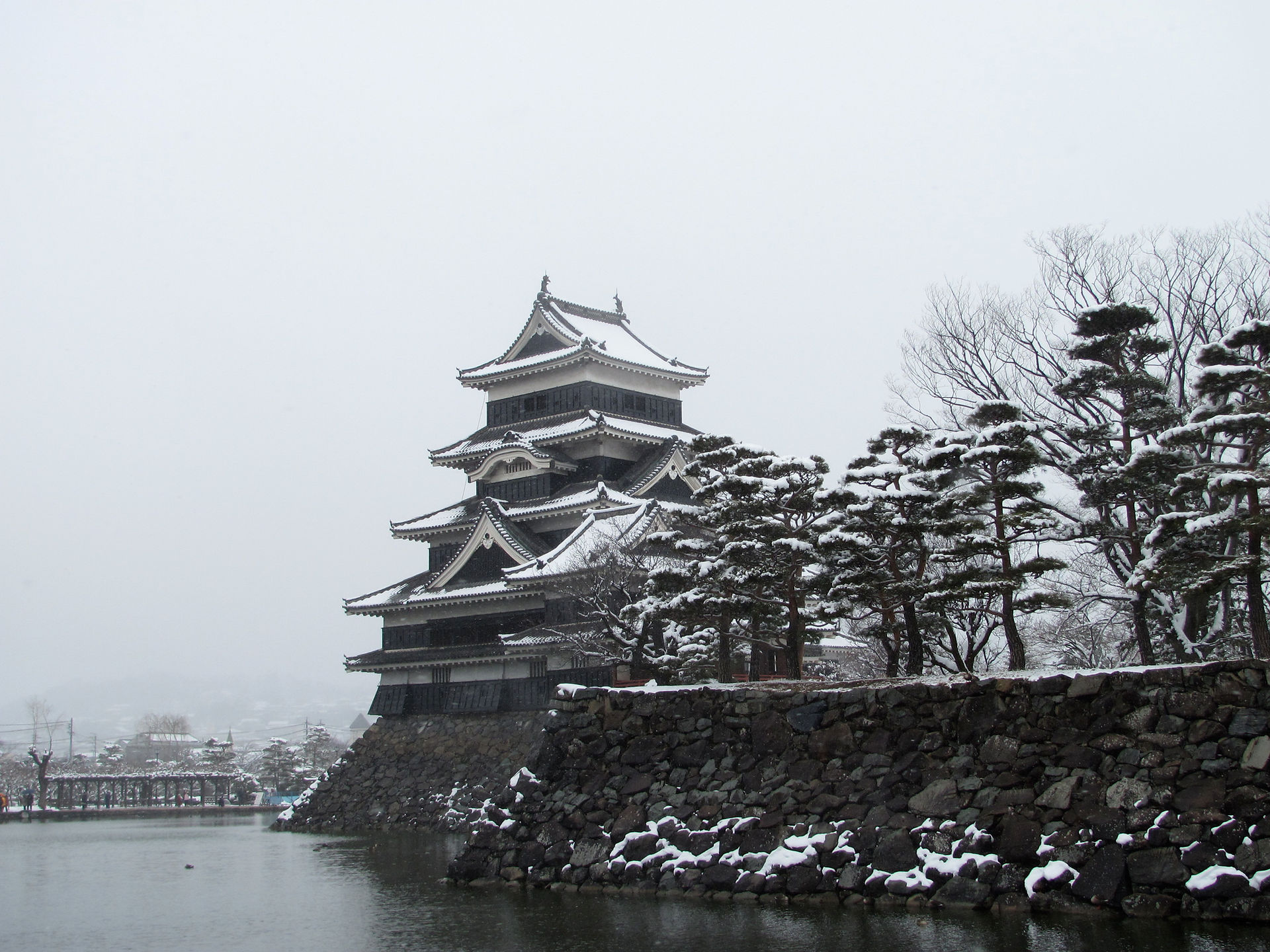
Background image: Matsumoto Castle in Nagano Prefecture was completed about the time of Columbus' first voyage to the New World.
1998 Nagano Winter Olympics
In my mother’s later years she liked to visit San Jose but always kept her
wristwatch on North Carolina time.
If I’d say we were going to do something at 2 o’clock, she’d have to
look at her watch and then figure out whether to add 3 or subtract 3. I
could never understand why she just didn’t put her watch on Pacific time
and live entirely in California for the length of her trip.
Traveling internationally as a reporter, I longed to live entirely where I
was for the duration of my work. But I had to keep one foot in California
where the Mercury News was because that was the time my deadline
was calculated in. It was the time my readers lived in.
Japan, for the Nagano Winter Olympics, was a foreign experience taken to
an entirely new level.
Something in the way the burly Tokyo dock worker at the bar beside me
grabbed a giant squirming prawn from the bowl, snapped off its head,
peeled the shell off in one practiced motion and popped it in his mouth
profoundly said that I wasn't in Kansas anymore.
It wasn't even the same day as Kansas. Or California. Japan was
discombobulating from the get-go.
The first Monday of the Olympics I went to the Hakuba ski area to cover
the men’s downhill, the most important event in alpine skiing. A storm
swept in from the Sea of Japan that covered the mountain with so much
snow that the race had to be postponed. My writing output for that day
consisted of a single weather story.
Tuesday I was sick in bed in the media village when the postponed
downhill I intended to return to was held. Favored Austrian skier
Hermann Maier’s crash was so spectacular that he – not gold medalist
Jean-Luc Chrétier from France – was the story of the day and week.
Maier’s body spinning through the air was Sports Illustrated’s cover
photo.
Feeling better, I caught a bus to Iizuna for the Wednesday afternoon
finals of the two-man luge. A Palo Alto athlete I had written about
before the Olympics was favored to win the first American medal in
that sport. As my guy was clinching the bronze medal on his last run, I
had to dictate the story by phone back to San Jose because the presses
were about to start Tuesday night, a day behind the day I was already
in.
So much of those Olympics, it seems now, happened in the dark –
landing in Tokyo, breakfast nearly every day, bus rides while writing my
final story of the day, visiting the Tokyo fish market – that it was my least
enjoyable Olympics. They needed something tacky or controversial in
figure skating.
Not the best way to end the string.
Selected Stores
Born in Japan, Skater Calls U.S. Home
NAGANO, Japan – She was born in the Land of the Rising Sun, but the light she remembers most sparkled from the Christmas tree at Rockefeller Center, where her mother took her ice skating as a little girl.
Much of Kyoko Ina's youth was spent discovering who and where she was. …
Figure skating had been a reliable reservoir of stories until Nagano, but there was no local athlete in the sport that year who demanded my attention and no clear American star who seemed worth extra focus. This story was based on work I did at the U.S. Figure Skating Championships in Philadelphia the month before Nagano and in Japan itself. It attracted me because of my interest in different cultures.
As in ’72, Host Nation’s best Chance for Glory Will Come in Ski Jumping
… At the 1972 Sapporo Winter Olympics, [Yukio] Kasaya sailed off the 70-meter ski jump and flew more than 275 feet, far past the ''critical point'' of the landing hill. For the second and final jump, officials lowered the starting point on the ramp, and Kasaya still sailed nearly 260 feet.
His gold medal was the first won by a Japanese in the Winter Olympics, and it is still the only one. …
The sport Americans associate with Japan is baseball, but I watched the 1972 Sapporo Winter Olympics on television while a student at Chapel Hill and remembered Yukio Kasaya and his two compatriots sweeping the ski jump medals on the last day of those Games. My original intention for this story was to leave for Nagano a week early so I could visit Kasaya and people who knew him for a couple of days. He lives on the northern island of Hokkaido, on which Sapporo is located. Then I planned to move to Japan’s main island of Honshu where Nagano is, for the rest of my Olympic trip. Travel expenses got in the way, however, and an afternoon meeting was the best I could arrange. In Nagano, Japanese ski jumpers won four of the nine medals including two of the three gold medals.
